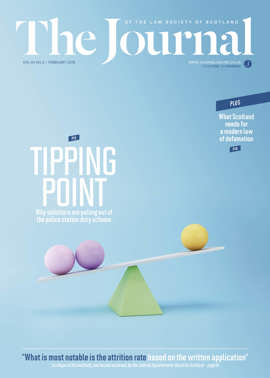A journey through trust compliance

Following the leak of the Paradise Papers, the public would be excused for thinking that trusts were unregulated structures designed to disguise ownership and avoid tax disclosure. But, as will be clear to most trustees and trust practitioners, there has been a significant increase in compliance in recent years that has directly impacted trust administration. This article provides a review and update of the current position.
FATCA's transatlantic reach
In 2010, the US enacted the Foreign Accounts Tax Compliance Act (FATCA), contained in the HIRE Act 2010, to combat the increasing problem of citizens’ non-disclosure of overseas assets. On the face of it, legislation designed to protect the US tax base did not seem relevant to trustees of Scottish trusts. Even if a party to the trust had US connections, surely it was for that individual to disclose their interest to the Internal Revenue Service (IRS). The US has no jurisdiction over trust affairs in Scotland and data protection laws would prevent disclosure.
Despite this, the UK Government had a problem. Under FATCA, a 30% withholding tax could be levied against the US source income of non-compliant foreign financial institutions. If a solution was not found, there was a real risk that this tax would be levied against the US income of all of major UK financial institutions. For large investment houses, this was unthinkable.
The matter was settled in 2012 when the UK entered into an intergovernmental agreement (IGA) with the US, brought into force by the International Tax Compliance (United States of America) Regulations 2014. UK entities, the definition of which extended to UK trusts, were now obliged to determine whether they were financial institutions. Many trusts were caught by virtue of holding a discretionary managed investment account. If a financial institution, the trust was required to register with IRS and disclose information to HM Revenue & Customs where individuals or entities that are US tax-resident (which includes all US citizens) hold a “debt or equity interest” in the trust (i.e. controlling persons). This would then be shared with their counterparts in the US.
What requires to be reported to HMRC? The trustees must obtain information from the parties to the trust (e.g. settlor, trustees, protectors and beneficiaries), including name and address, tax residence and citizenship. If a person is US tax-resident the trustees must also obtain a tax identification number.
So what has been the impact of FATCA on Scottish trustees? In many instances, lay trustees have not required to register directly with IRS and report directly to HMRC. This is because many modern trusts appoint a trust company to act alongside lay trustees. In such cases the company, as a financial institution in its own right, must register with IRS and report any “reportable accounts” of the trust to HMRC. The trust is deemed to be compliant and is treated as non-reporting.
In addition, as part of the discussions for the IGA, the UK negotiated a number of exceptions, including the category of owner-documented financial institution (ODFI), which was specifically designed to reduce the reporting burden on small family trusts. Where a trust holds assets with a financial institution in the UK (e.g. an account with investment managers), and the trustees complete a self-certification form disclosing the tax residency and citizenship of the controlling persons, the financial institution can agree to act as a withholding agent and report on behalf of the trust, in relation to the accounts it holds. In such circumstances, the obligation on the trustees to register the ODFI with IRS is removed.
Despite the exceptions to registering with IRS and reporting to HMRC, FATCA has resulted in the need for trustees to carry out due diligence to ascertain the tax residency and citizenship of the parties to the trust. Even if they are not required to register and report, any financial institution doing so on their behalf will, in most circumstances, require them to complete a self-certification form, confirming the personal details and tax status of all controlling persons.
CRS – like FATCA, but different
If trustees thought that FATCA was the end of tax compliance for trusts, they were to be sorely disappointed. The G20 nations had long been considering a global standard in the exchange of tax information by participating jurisdictions, and requested the assistance of the OECD in developing one. This culminated in the Common Reporting Standard (CRS), which closely follows the approach of FATCA. In October 2014, 45 jurisdictions (including the UK) signed an agreement to exchange information from 2017. This number has been steadily rising and is now over 100.
Although trustees could have been excused for believing that their approach in complying with FATCA would be sufficient for CRS, this is not true in all cases. Whereas the IGA that enacted FATCA in the UK was a bilateral agreement, CRS is a multi-jurisdictional agreement with a common standard implemented across all participating jurisdictions. As such, there are no special exemptions for the UK and the effect has been to broaden the requirements for tax compliance.
The main difference between FATCA and CRS concerns the treatment of ODFIs and charitable trusts. ODFIs do not exist as a category for CRS, and the trustees of an ODFI for FATCA purposes must take on the reporting obligations for CRS, unless the financial institution holding the assets undertakes reporting as a third-party service provider. As a result, in some trusts the responsibility for reporting to HMRC will depend on whether the individual is caught by FATCA (i.e. an individual is a US person) or whether they are caught by CRS. It is likely that many lay trustees will not realise this distinction and that they have any obligation to report.
With regard to charitable trusts, while the legislation that enacted FATCA in the UK exempted charities, CRS has no such concessions. As a result, charities that are classified as “financial institutions”, most commonly because over half of their income is earned through managed investments, will require to report any payments to beneficiaries that are tax-resident in reportable jurisdictions under CRS. For grant-making charities, this will in most instances require that the recipient completes a self-certification form confirming their name, address, tax residence and, if they are non-UK tax resident, their tax identification number and date of birth. If payment is made to an entity rather than an individual, the status of that entity under CRS should be sought.
Trust Registration Service – an AML measure
The reporting burden on trustees increased further when the EU’s Fourth Anti-Money Laundering Directive came into force on 26 June 2017, with provisions requiring trustees to maintain accurate and current information on the trust’s “beneficial owners”. In certain circumstances, the trustees are then required to submit this information electronically to HMRC through the Trust Registration Service (TRS), replacing the previous requirement for a form 41G to be submitted.
Essentially a UK trust needs to register with HMRC where it is liable to pay income tax, capital gains tax, inheritance tax, stamp duty land tax, land and buildings transaction tax or stamp duty reserve tax. Trustees of a non-UK resident trust will only need to register or update their details on the register in respect of a given tax year if the trust receives UK source income or has UK assets on which the trustees have incurred a liability to pay the abovementioned taxes.
Trustees will need to provide information about the trust and its “beneficial owners”. These include the settlor (even if deceased), trustees, all other natural or legal persons exercising control over the trust (e.g. protectors), beneficiaries and any individual referred to as a potential beneficiary in a document from the settlor relating to the trust.
As well as the name of the trust, the date it was established and details of where it is resident must be disclosed. The trustees will also need to provide details of the assets originally settled. For long established trusts, this information may not always be easy to find. In relation to the individual parties to the trust, they will need to provide full names, dates of birth, national insurance numbers or unique tax references (if they have one) or residential address if they do not, and if they are non-UK resident, their passport or ID card number.
If the trust has a class of beneficiaries, the trustees need only provide a description of the class and then disclose the identity of each person once they receive a benefit from the trust.
The deadline for any trust registering for self-assessment for 2016-17 was extended to 5 January 2018. For existing trusts which already have a UTR, the filing deadline is 5 March 2018 (extended from the original deadline of 31 January).
What next? Going forward, trustees will need to update the register in relation to each tax year for which there is a liability to tax, by 31 January, with any changes to the information required, or provide a notification that they are not aware of any changes.
Trustees not required to register may nevertheless be obliged to keep written records of the information described, and to disclose it when entering into any transaction on behalf of the trust or when requested by any law enforcement agency.
Although the TRS is not currently a public register, the EU’s Fifth Anti-Money Laundering Directive, which is in the EU legislative process, requires trust registers to be made public. It may simply be a matter of time before a public register of beneficial ownership becomes a reality.
MiFID II and LEI
Enacted by the EU to regulate firms that trade in financial instruments, the Markets in Financial Instruments Directive II (MiFID II) also impacts legal entities or structures, including trusts, that hold assets on financial markets. This is because from 3 January 2018, the trust’s financial service provider has been unable to execute transactions on behalf of the trustees without the trustees obtaining and providing them with a legal entity identifier (LEI). Although the trustees can apply directly to the London Stock Exchange for a LEI, most financial service providers will do so on the trustees’ behalf. The LEI must then be renewed annually.
The future
It is clear that since FATCA was brought into force in the UK, the direction of travel for trusts is one of increased regulation and disclosure of information. Trustees must be careful to carry out thorough due diligence of all parties to the trust and maintain and update their records to ensure they are complying with their obligations.
In this issue
- Enforceable rights or progressive policy goals?
- Data processors beware: GDPR holds you responsible too
- Insolvency in a post-Carillion world
- Employee ownership: a strategy that fits
- A mediation Act? The Irish experience
- Journal magazine index 2017
- Reading for pleasure
- Opinion: Andrew Tickell
- Book reviews
- Profile
- President's column
- Digital progress given go ahead
- People on the move
- Tipping point for legal aid?
- Arrest: all change
- Legal software: are you still listening to Gangnam style?
- Defamation law for the digital age
- Choosing our judges: could we do it better?
- A journey through trust compliance
- The Cashroom: 10 years of service
- From dockets to defences
- Sex discrimination runs deep
- Wealth not a bar to s 28 claims
- No spying on the job
- Scottish Solicitors Staff Pension Fund: not the final instalment?
- Scottish Solicitors' Discipline Tribunal
- The Clark Foundation for Legal Education
- LBTT's birthday alert
- Doing all the white stuff
- Solicitor's CBE for life of service
- From the Brussels office
- Paralegal pointers
- Public policy highlights
- The kindest cut
- Wish list for the review
- Benchmarking: take the benefits
- Tax evasion: don't get caught up
- Ask Ash
- Time to call out harassment
- Q & A corner






